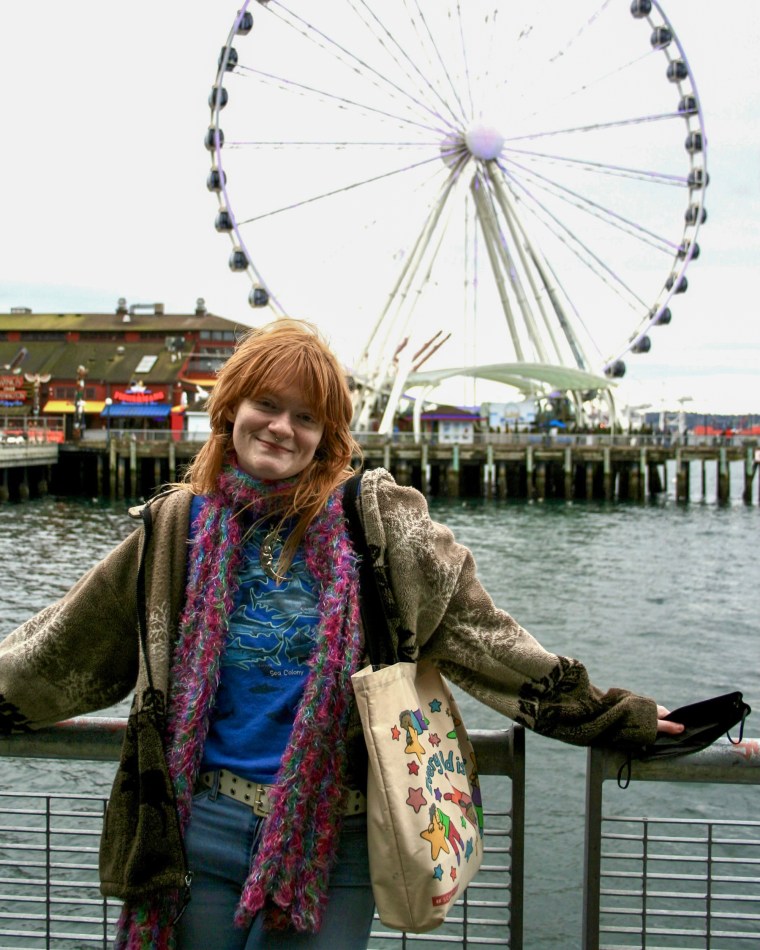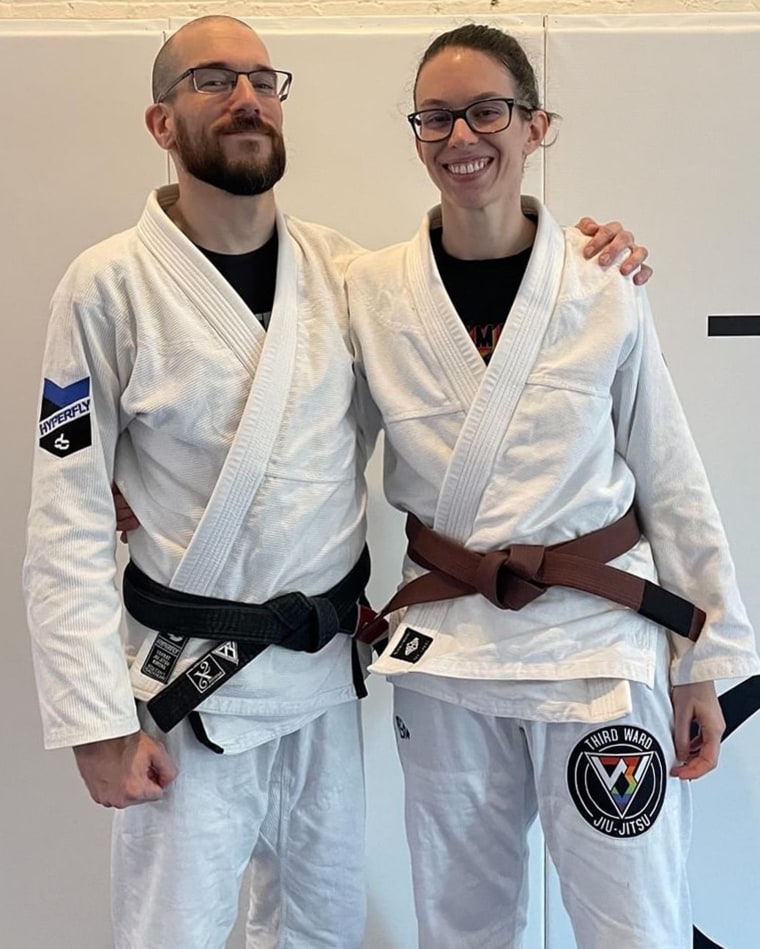Self-defense classes geared toward LGBTQ people can be found sprinkled across the United States, and instructors and students say the skills these classes provide are giving attendees a boost of confidence and a sense of community in a fraught political environment.
“Pretend someone’s coming for you. How would you kick them if you were fighting for your life?” an instructor at Queer Fight Club in St. Louis asked attendees during a recent self-defense class.
Tori Lohmann, who is nonbinary, was among the nine students in the class. Lohmann said they never imagined joining a self-defense group but found themselves drawn to Queer Fight Club six months ago because of a lack of self-confidence stemming from the current political climate.
“I just felt so angry all the time about the state of the world,” Lohmann, 26, told NBC News.

Lohmann’s concerns come at a time when heated rhetoric, federal policies and state legislation targeting the LGBTQ community — and particularly transgender and gender-nonconforming people — are on the rise. The American Civil Liberties Union has tracked 569 anti-LGBTQ state bills in 2025 so far, and since coming into office in January, President Donald Trump has signed several executive orders aimed at the trans and nonbinary community, including one that proclaims the U.S. government will recognize only two unchangeable sexes, male and female.
Since attending Queer Fight Club twice a month starting in January and learning skills like a two-punch combo, various kicks and how to block hits, Lohmann said they “feel so much more confident in myself.”
“Not just my ability to protect myself, but also to protect my community members,” they added.
‘You need to be prepared’
Mixed martial artist Mad Green, who founded Queer Fight Club in 2023, said they were inspired to create a self-defense group specifically tailored to LGBTQ people after observing a lack of self-defense skills in the community. They wanted to share their knowledge and prepare other queer people for potential altercations.
“A lot of people, if they haven’t been in a physical altercation, don’t necessarily think it’s going to happen,” Green said, adding that it might be more likely than many people want to believe. “You need to be prepared for it.”
According to crime data published by the FBI last year, violent crime in the U.S. decreased by an estimated 3% from 2022 to 2023, while hate crime offenses increased by about 3.7% during the same period. Sexual orientation and gender identity were the third and fourth most common bias motivations in 2023, after race/ethnicity and religion.
Queer Fight Club has a “pay what you can” policy, but Green said they ask those who can afford it to pay $15 a class to help pay for equipment and the cost of renting out a gym space.
For the first year, Green said, there were about 20 people taking their biweekly self-defense classes. Since the November election, however, there’s been increased interest in self-defense from the local queer community due to a “refreshed fear” around personal safety, and they’ve had about 300 new people join at least one of their classes, Green said.
“My favorite thing about fight club is seeing someone come in for the first time, and then they throw a punch, and they’re like, ‘I didn’t know I could do that,’” Green said. “Just letting people know that they can is really empowering by itself.”
‘Space for everyone to feel welcomed’
Andrew Degar and his spouse, Sarah, founded the nonprofit Third Ward Jiu-Jitsu in Houston in 2019 after noticing a need for a more inclusive mixed martial arts space.
“We were both coaching at an MMA gym and just hated the toxicity of the culture, and we wanted to open a space for everyone to feel welcomed and included,” Degar said.
The couple has been providing free self-defense classes to those in the Houston area since they first started their organization. They added classes specifically geared toward the LGBTQ community in August 2023, and Degar said they now have queer people from around the state who travel to take them.

“People are looking for a safe space,” Degar said. “They’re looking for trustworthy people, and we are recognized as a resource in the queer community in Texas.”
Degar said Third Ward Jiu-Jitsu incorporates various scenarios during self-defense classes that focus on de-escalating conflicts while ensuring readiness in a variety of situations.
“We go into how you may be feeling unsafe from someone you don’t know, then we will even go as far as someone who’s trying to harm you. Here’s how we can attack back,” he said.
‘Protecting ourselves and each other’
Even in a state like New York, which is known to be among the most progressive when it comes to LGBTQ rights, reports of hate crimes have surged in recent years. A report published by the Office of the New York State Comptroller last year found reports of hate crimes increased nearly 70% from 2019 to 2023, with anti-LGBTQ crimes among the most common.
Groups like Fearless Queers, which has been organizing self-defense pop-up classes throughout New York City since 2022, want LGBTQ people — and particularly trans people, who are more likely to be victims of violent crime — to feel less vulnerable in this environment.
Co-founder Chrissy Rose said they also want those who attend a Fearless Queers session “to see capable queer and trans fighters leading their class.”
“I want them to see the possibility that they can defend themselves and above all that they are worth that fight,” Rose said.
Rose and their co-founder, Tara Bankoff, who are both experienced in martial arts, said they’ve seen demand for their classes rise this year, and they now serve hundreds of New Yorkers every month.
Their main priorities, Rose said, are to ensure their classes are accessible and free, and to encourage attendees to trust themselves.
While the group hosts various pop-ups for self-defense fundamentals and open-mat sessions for drills and solo practice, Rose said classes focus heavily on verbal techniques to avoid both victimization and criminalization.
“Trans women are stereotyped as being aggressive, meaning that if they defend themselves, they have a much higher risk of being criminalized or just socially punished for doing so than, say, a cisgender woman does,” Rose explained. “We deprioritize striking and emphasize grappling and verbal self-defense in our curriculum for that reason.”
New York City resident Alexis Gee, who is nonbinary, said she reached out to Fearless Queers in November after feeling afraid and unprotected.
“In communities like ours, we have to be vigilant about protecting ourselves and each other, and I didn’t feel like that was something I was equipped to do,” Gee, 32, said.
In January, Gee had the courage to attend her first Fearless Queers class and has been going consistently since then.
“We don’t have to be alone in our fear, and we don’t have to be aggressive and angry in order to feel protected,” Gee said. “We just need to know who our allies are and how to reach them.”






